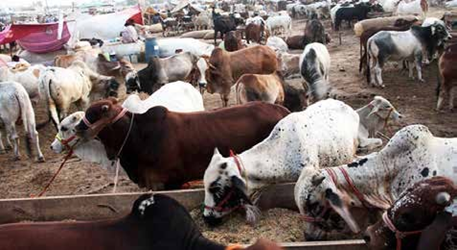Animal sacrifice in Pakistan plummeted drastically last Eid ul Azha because of the Covid-19 outbreak, wrecking livestock farmers all around. Paradoxically, however, animal sales this year soared despite a fresh wave of the outbreak.
Last year, when the coronavirus was still the new and only talk of the town, Eid festivities had remained low key as the virus brought with it a wave of bone chilling terror. Corona had caused numerous deaths and people had decided to sit home and find alternative ways to cope with the newfound Eid gloom.
Farmers raise cattle to sell at a premium in cities at the time of Eid to generate funds for purposes that cannot be covered by routine income. The annual bonus is often used for purposes like replacing old agricultural tools, home repairs, investing in assets, and marrying off children.
According to an article by DAWN, “In desperation to contain losses, many traders decided to return to the market early with the unsold stocks instead of waiting for buyers until the third day of Eid.” There was no doubt as to why the market for sacrificial animals shrank and prices crashed last Eid Ul Azha. Market watchers noticed a 40-50 percent fall in the total volume of livestock trade. Prices of sacrificial animals soared forcing many aspiring buyers to return home empty handed.
Nevertheless, this Eid seemed to turn the tables as the Karachi cattle market reported historic sales as a huge number of animals had been sold ahead of Eid al-Adha. The mandi media spokesperson cited the figure of 700,000 slaughter animals that were originally brought to the mandi this year and noted that only 5 percent of them remain.
Punjab this year expected the business of sacrificial animals to the tune of PKR 110 billion till the third day of Eid Ul Azha, which is PKR 20 billion or 20 percent higher than that of last year. Shahpur
Kanjran cattle market was projected to have a business of nearly PKR 30 billion this year.
However the Lahore Division Cattle Market Management Company Chief Operating Officer Rehan Ahmad said, “I think this year we cannot go more than 20 per cent higher than the last year’s animals trade due 50 to 60 percent increase in the animals’ price, impact of Covid and other issues,” he added.
“Seasonal festivities related to Eid-ul-Azha generated over PKR 325 billion worth of economic activities, as Pakistanis slaughtered around 5.86 million animals during the three-day festival”, The News daily reported. “Former chairman of Pakistan Tanners Association (PTA), Agha Saidan, who owns Royal Leather, said that the leather industry faced huge losses last year, when raw hides was destroyed by humidity [before they could reach processing plants].”
The question at hand is why the sales dropped last year but practically soared this Eid-ul-Adha despite the looming threat of coronavirus being very real. Observers say the reason could be that Pakistanis at the moment have been desensitized to the fear and terror that this epidemic brought with it.
However precautionary measures still stand as the Ministry of Health announced that Covid guidelines were to be followed on Eid. The ministry also showed deep concerns about the cattle market being a source for the spread of the virus. “Social distancing should be ensured at the cattle markets besides also implementing directives regarding facemask”. It was also made clear that those selling and purchasing the animals should be vaccinated. Government also advised citizens to refrain from going to large family gatherings as mass spreading of the virus is still quite a serious threat.
The Sindh government also issued guidelines to be followed this Eid. Under to fresh SOPs, the government has advised the people to prefer collective sacrifice of the animals this Eid ul-Adha instead of individual fulfilment of the ritual in an attempt to contain the spread of coronavirus.” The government even identified specific locations in the province for the collective sacrifice of animals on Eid-ul-Azha.
Last year’s economic disaster led farmers to think smart as they took the sales of sacrificial animals online in order to have a successful festival. “Dozens of apps and websites have popped up to have animals delivered to doorsteps, slaughtered or donated to charity”, DW (German News) reported. “Shakil Dehelvi, joint secretary-general of the Alamgir Welfare Trust, told Reuters that the charity received its target number twice as fast as compared to last year.”










